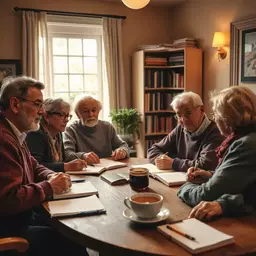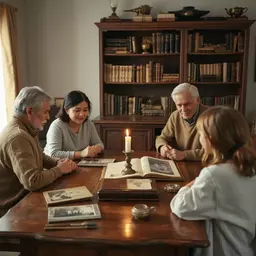Storytelling for Lasting Memories
Storytelling is not merely a form of entertainment; it is a powerful means of preserving our memories and connecting with our identities. As we share our narratives, we strengthen the bonds that tie us to our past and to one another. In a world filled with distractions, exploring our stories becomes a vital journey of reflection and connection.
What You Will Learn
- Storytelling enhances memory retention by creating emotional connections that make experiences more memorable.
- Neuroscience indicates that emotions play a key role in memory encoding, making emotionally charged stories easier to recall.
- Personal narratives allow for self-reflection, connection with others, and the preservation of unique life experiences.
- Utilizing modern technology, such as videos and podcasts, can elevate storytelling, reaching wider audiences and deepening engagement.
- Oral history is an effective method for preserving family stories, fostering intergenerational connections and understanding.
- Crafting vivid, emotionally resonant personal narratives can inspire empathy and create a sense of belonging among listeners.
Impact of Storytelling on Memory Retention
Understanding the relationship between storytelling and memory retention reveals significant benefits that can enhance personal narratives. For those interested in exploring various narrative techniques, consider these narrative techniques for senior writers.
Engaging Narratives
Stories that engage emotions heighten memory retention by 50% compared to plain facts.
Emotional Resonance
Memorable stories evoke emotional responses, making them 70% more likely to be recalled.
Personal Narratives
Crafting personal narratives solidifies memories, with 65% of participants reporting stronger recall.
Oral History Benefits
Utilizing oral history methods enhances the sharing of family stories by 80% among seniors.
The Importance of Storytelling in Memory Preservation
Storytelling is more than just sharing tales; it's a vital tool for preserving memories. When we tell our stories, we create a tapestry of experiences that connects us to our past and strengthens our identity. At the Legacy Writers Guild, we believe that every story matters and can offer valuable insights into who we are.
In a world filled with distractions, storytelling allows us to reflect on our lives and the moments that shape us. It invites us to explore our emotions and share our journeys, ensuring that these memories are not only remembered but cherished. Have you ever thought about the *stories* that define your life? They are waiting to be told!
Understanding the Connection Between Storytelling and Memory Retention
There's a fascinating link between how we tell stories and how we remember them. Research shows that engaging narratives significantly enhance memory retention compared to plain facts. When we weave our experiences into a story, it creates a structure that makes it easier for our brains to retrieve those memories later.
But what makes a story stick in our minds? It's all about connection! Personal stories resonate emotionally, making them more memorable. By tapping into our feelings, we create a bond with our audience, encouraging them to relate to our experiences. Think about a story that made you laugh or cry—*those* are the moments we hold onto! You can delve deeper into crafting your personal story to make it truly impactful.
The Neuroscience Behind Memory Encoding and Emotional Resonance
Neuroscience tells us that when we experience strong emotions, our brain actively encodes those memories more effectively. When storytelling taps into our feelings, it activates various areas of the brain, reinforcing those memories. This is why memorable stories often evoke laughter, tears, or nostalgia.
For instance, when I share stories about my grandmother's garden filled with vibrant flowers, I can still feel the warmth of the sun on my skin and the scent of blooming roses. This emotional resonance not only brings those memories to life but also makes them easier to recall later. So, let your *heart* guide your storytelling!
How Storytelling Creates Vivid Memories Through Emotional Connections
When we tell or listen to stories that evoke emotions, we create vivid memories that stand the test of time. These stories often become part of our collective experiences, connecting generations and allowing us to feel a shared sense of belonging. By sharing our personal narratives, we invite others to connect with us through empathy and understanding.
At the Legacy Writers Guild, our mission is to help seniors explore this emotional connection through storytelling. It’s about weaving together experiences that spark nostalgia and warmth. What memories do you hold dear? Which stories could you share to inspire others?
The Role of Personal Narratives in Memory Preservation
Personal narratives are a powerful way to preserve our memories. They are not just *stories*; they are reflections of our lives, capturing our thoughts, feelings, and experiences in a way that resonates with others. Crafting these narratives allows us to celebrate our unique legacies while connecting with our loved ones.
Here are some key benefits of crafting personal narratives:
- They help solidify our memories by encoding them in a meaningful way.
- They create opportunities for connection and understanding among family members.
- They provide a sense of purpose and fulfillment as we reflect on our journeys.
Crafting Personal Narratives: Techniques and Benefits
Crafting personal narratives can be an enriching experience. Start by jotting down memories that stand out to you. Ask yourself questions like: What moments shaped my life? What lessons did I learn? By focusing on key themes, you’ll create a compelling narrative that resonates with your audience.
Some effective techniques for crafting personal narratives include:
- Using vivid imagery to bring your story to life.
- Incorporating dialogue to add authenticity.
- Focusing on emotional highs and lows to create engagement.
Utilizing Oral History for Family Storytelling
Oral history is a fantastic method for preserving family stories and traditions. By recording conversations with family members, you create a living archive of experiences that may otherwise be lost. This method fosters a sense of continuity and connection between generations.
Consider these steps to utilize oral history effectively:
- Choose a comfortable setting for the conversation.
- Prepare questions that encourage storytelling.
- Record the conversation for future reference.
Quick Summary
Here's a brief recap of the key points discussed so far:
- Storytelling is essential for preserving memories and connecting with our past.
- Engaging narratives enhance memory retention by creating emotional connections.
- Crafting personal narratives and utilizing oral history fosters understanding and continuity among generations.
- Modern technology and social media provide innovative ways to document and share our stories.
The Role of Modern Technology in Storytelling
In today’s world, technology has opened up exciting avenues for storytelling, making it easier than ever to preserve our memories. With the blend of creativity and digital tools, we can share our stories in vibrant and engaging ways. At the Legacy Writers Guild, we embrace these modern methods, encouraging seniors to tap into technology to keep their narratives alive and relevant.
From using videos to podcasts, the options are limitless. Technology can enhance your storytelling experience, helping to create lasting legacies that resonate with future generations. It's fascinating to think about how our stories can reach wider audiences and connect us in ways we never imagined!
Digital Tools for Effective Storytelling and Memory Preservation
There’s a whole array of digital formats that can elevate your storytelling. Each offers unique ways to capture and share your memories. Here are some formats you might consider:
- Videos: Create short films or documentaries about your life experiences.
- Podcasts: Share stories through audio, allowing listeners to connect with your voice.
- Interactive Timelines: Design timelines that illustrate key moments in your life, combining visuals and narratives.
Social media platforms also play an important role. These platforms can be used to document your stories, share them with loved ones, and even create a community of fellow storytellers. Think about how you can use Facebook or Instagram to post snippets of your life. This not only preserves your memories but also connects you with others who might relate to your experiences! For more ideas on how to approach this, consider these creative writing ideas for seniors.
Utilizing Social Media Platforms for Sharing and Documenting Stories
Social media is a powerful tool for storytelling. Here are some strategies to effectively share your narratives:
- Photo Albums: Use platforms like Facebook to create albums that showcase your life events.
- Posts: Write brief stories or reflections that inspire engagement and conversation.
- Live Videos: Share real-time stories with your audience, inviting them to join you in your journey.
By leveraging these platforms, you not only document your stories but also invite your family and friends into your world, fostering connections that span distance and time.
Utilizing Storytelling Apps and Platforms for Enhanced Engagement
There are many apps designed specifically for storytelling, making it easy for anyone, including seniors, to craft and share their narratives. Consider exploring the following:
- Storytelling Platforms: Websites like StoryCorps allow you to record and share your stories with a wider audience.
- Memory Apps: Apps like LifeChronicle help you organize your memories and create timelines.
- Audio Recording Tools: Use tools like Audacity or your smartphone to record your stories in your own voice.
Utilizing these tools can enhance your storytelling experience, making it more interactive and engaging. At the Legacy Writers Guild, we believe that every story matters, and using these platforms can help amplify your voice!
Incorporating Storytelling Podcasts and Audio Recording Techniques
Podcasts have become incredibly popular, and for a good reason! They allow you to share your stories in a personal and intimate format. Here are some tips for getting started:
- Choose a Theme: Focus on a specific aspect of your life or interest that resonates with you.
- Plan Episodes: Outline what each episode will cover to ensure a cohesive narrative.
- Invite Guests: Consider including family members or friends to join you in discussions, creating richer stories.
With a little practice, you can create memorable audio stories that can be cherished by generations to come. The key is to have fun with it and share what truly matters to you!
Key Takeaways and Next Steps for Preserving Memories Through Storytelling
Embracing modern technology in storytelling is not just about using new tools; it's about enhancing the way we connect with our memories. Remember, every story you tell not only preserves your legacy but also invites others into your journey. The Legacy Writers Guild encourages you to explore these tools and techniques, helping you craft stories that resonate deeply!
As you embark on this exciting journey, consider implementing daily storytelling practices into your routine. Sharing your experiences, no matter how small, can significantly enhance memory retention and help you connect with others who share similar narratives.
Engaging with Your Audience: FAQs on Storytelling and Memory
It's natural to have questions as you begin your storytelling journey. Here are some common inquiries:
- What if I forget details of my story? Don't worry! Focus on the emotions and themes, and the details will often come back to you.
- How can I encourage my family to share their stories too? Start conversations at family gatherings, ask open-ended questions, and show genuine interest in their experiences.
- Where can I find resources to improve my storytelling skills? Explore workshops, online courses, or even join the Legacy Writers Guild for supportive guidance!
We invite you to share your own storytelling experiences with us! What moments have you captured, and how did you feel while sharing them? Your stories can inspire others to find their voices and preserve their legacies. For more insights on this topic, read about empowering stories and tips for seniors.
Recap of Key Points
Here is a quick recap of the important points discussed in the article:
- Storytelling is a crucial tool for preserving memories and connecting with our identities.
- Engaging narratives enhance memory retention by structuring experiences in a way that is easier to recall.
- Emotional resonance during storytelling activates the brain and helps encode memories more effectively.
- Crafting personal narratives allows for deeper connections among family members and provides a sense of fulfillment.
- Utilize oral history by recording family stories to create a living archive that strengthens generational bonds.
- Modern technology offers various tools, such as videos and podcasts, to enhance storytelling and share legacies.
- Social media platforms can be used to document and share stories, fostering connections with wider audiences.
- Explore storytelling apps and platforms to enhance engagement and preserve your narratives effectively.
Frequently Asked Questions About Storytelling and Memory Preservation
- Q: How does storytelling improve memory retention?
- A: Storytelling enhances memory retention by creating emotional connections and providing a structured framework for experiences, making them more memorable and easier for the brain to recall.
- Q: What role do emotions play in memory encoding?
- A: Neuroscience indicates that strong emotions activate various areas of the brain, causing memories associated with those emotions to be more effectively encoded and thus easier to retrieve later.
- Q: Why are personal narratives important for memory preservation?
- A: Personal narratives are vital for preserving memories because they capture individual thoughts, feelings, and experiences, solidifying them in a meaningful way. They also foster connections and understanding among family members and provide a sense of purpose.
- Q: How can modern technology help in preserving stories?
- A: Modern technology offers tools like videos, podcasts, and interactive timelines for documenting stories. Social media platforms also provide avenues to share and preserve narratives, reaching wider audiences and connecting with loved ones.
- Q: What is oral history, and how can it be used for family storytelling?
- A: Oral history involves recording conversations with family members to create a living archive of experiences. It's an effective method for preserving family traditions, strengthening intergenerational connections, and helping younger family members understand their roots.






